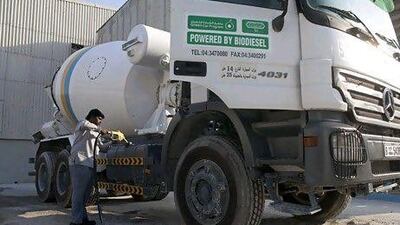Biofuel and energy-efficient cars are making inroads in the Emirates but fuel subsidies are undermining the appeal of the "green drive".
What's the alternative?:
Energy Join The National as it explores alternative to fossil fuels. Learn more
Biodiesel is now being used to power some commercial fleets in the UAE. The low price for its fossil-based diesel is preventing the wide-scale adaption of the environmentally friendly fuel, according to the country's only producer.
"Conventional diesel is about a third cheaper in Abu Dhabi than in Dubai, and around a third cheaper in Dubai than in Australia," said Karl Feilder, the chairman of the Neutral Group.
"This presents some real challenges for anyone wanting anything to do with efficiency of fuel usage, whether that be improving the way we use fossil fuels, or using newer technologies and different fuels."
The Neutral Group advises companies in the UAE on how to improve fuel efficiency in commercial fleets. Its subsidiary Neutral Fuels has built a plant in Dubai that recycles used cooking oil from fast food chain McDonald's into biodiesel, which is used to power the restaurant's lorries. Since the plant started running six months ago, two more companies have started using the recycler's biodiesel, according to Mr Feilder.
While recycled biodiesel is commercially viable alongside fossil-based diesel, biodiesel made from plants such as corn and grain is more expensive, and cannot compete with conventional fuel. The case for such biofuel is further undermined by the limited scope for growing the feedstock in the unfavourable conditions of the region.
Fuel efficiency is starting to become popular in the retail sector. Sales of hybrid cars made by Lexus are outpacing the company's overall sales growth in the UAE. Hybrid cars generate electricity through the engine and the vehicle's movement, which helps cut fuel consumption and reduces carbon emissions.
Sales of energy efficient cars made by Lexus, the only vendor of hybrid vehicles in the UAE apart from Mercedes, increased by 15 per cent last year, according to Saud Abbasi, the general manager for Lexus at Al-Futtaim Motors. Mr Abbasi concedes this growth comes from a low base, but it outperformed general sales, where growth stood at about 7 per cent this year.
The Middle East trails other parts of the world, but drivers in the Emirates has proven to be the most receptive to hybrids in the region, said Mr Abbasi.
"The awareness and demand levels aren't yet were they are in the rest of the world yet, especially in North America and Europe."
Take-up is not helped by basic economics. Buyers choosing a top-range hybrid over a conventional Lexus will be paying about Dh40,000 (US$10,890) more, and cheap, subsidised fuel at the pump is making it difficult to offset the additional cost with savings in petrol.
"If a customer is looking at justifying a hybrid purchase by looking at fuel efficiency, [cheap petrol prices] make that more difficult in the Middle East," says Mr Abbasi.
Petrol prices rose twice in the UAE in 2010, but momentum towards further increases has abated since, and fuel is still heavily subsidised. Dubai's Emirates National Oil Company has been recording heavy losses as a result.
Unlike the Abu Dhabi National Oil Company, it cannot rely on its own production, and has to purchase its stocks on the international markets.
twitter: Follow our breaking business news and retweet to your followers. Follow us

